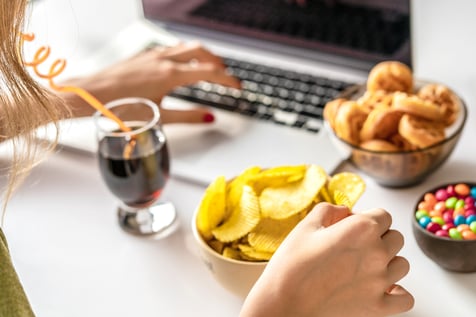 It’s no secret that our emotions impact what we eat, when we eat, and how much we eat. In fact, sometimes it seems that the strongest cravings hit when our emotional and mental well-being is at its weakest. Emotional eating is a way to, in the short term, relieve or suppress negative feelings, such as sadness, stress, anger/frustration, or boredom. However, emotional eating can also lead people to make poor choices, such as skipping or forgetting meals, consuming fast food frequently, or consuming alcohol or caffeine in excess, all of which may have health consequences, including unintentional weight gain.
It’s no secret that our emotions impact what we eat, when we eat, and how much we eat. In fact, sometimes it seems that the strongest cravings hit when our emotional and mental well-being is at its weakest. Emotional eating is a way to, in the short term, relieve or suppress negative feelings, such as sadness, stress, anger/frustration, or boredom. However, emotional eating can also lead people to make poor choices, such as skipping or forgetting meals, consuming fast food frequently, or consuming alcohol or caffeine in excess, all of which may have health consequences, including unintentional weight gain.
To help prevent emotional eating, focus on the following steps.
Identify the difference between emotional hunger and physiological hunger.
Emotional hunger typically comes on suddenly with an urge to resolve the “hunger” quickly, often involves a desire for a specific type of food or food group, and usually results in overeating. In contrast, physiological hunger tends to be more gradual, allows us to stop eating when we are full, and doesn’t typically cause guilt that is experienced with emotional hunger.
Establish a healthy eating routine.
Aim to eat two to three well-rounded meals each day. Meals don’t have to be complicated: the easier and quicker, the better. Try pairing a protein source (chicken, salmon, ground turkey or lean beef, and so on) with various grilled, roasted, or steamed vegetables and seasonings and sauces of your choice for a quick, inexpensive, and easy meal.
Ensure you’re consuming enough of the right foods. Consume plenty of fruits, vegetables, whole grains, lean proteins and low-fat dairy products while limiting your intake of highly processed foods, added sugars, salt/sodium, and alcohol. Talk with a registered dietitian to develop a healthy eating routine that meets your individualized needs while helping manage causes and symptoms of emotional eating.
Manage your overall stress.
There is evidence to suggest that increased cortisol, the hormone released during stress, may result in an increased appetite, leading to overeating and potential weight gain. Rather than turning to food for comfort, be sure to control stress by journaling, exercise, practicing mindfulness/meditation, and/or social support.
This blog was written by Lindsey Recker, MS, Registered Dietitian. To learn more about the NIFS bloggers, click here.



 Picture this: It’s the last 10 minutes of your favorite group fitness class on the
Picture this: It’s the last 10 minutes of your favorite group fitness class on the 
 The holidays are HERE! We all know what happens around the holidays. I see two extremes in my practice as a Registered Dietitian:
The holidays are HERE! We all know what happens around the holidays. I see two extremes in my practice as a Registered Dietitian: A question I get asked frequently is, “Why are you interning for a fitness center when your major is social work?” The first thing people think of when they hear social work is working at the Department of Child Services, and being in a fitness center doesn’t seem to make sense. But social work is so much bigger than that, and it continues to expand into new places, such as fitness and sports.
A question I get asked frequently is, “Why are you interning for a fitness center when your major is social work?” The first thing people think of when they hear social work is working at the Department of Child Services, and being in a fitness center doesn’t seem to make sense. But social work is so much bigger than that, and it continues to expand into new places, such as fitness and sports. It’s safe to say that 2020 has been one a heck of a year (and it’s barely half over!)—the good, the bad, the ugly. At times, it’s felt as if an entire decade has passed. No matter how you slice it, the fact that we’ve experienced something as novel as a global pandemic still feels weird to say, think about, and sometimes fully appreciate. It has been a tumultuous time outside of COVID-19 as well, and every person has had a unique experience, a unique perception, and unique challenges along the way.
It’s safe to say that 2020 has been one a heck of a year (and it’s barely half over!)—the good, the bad, the ugly. At times, it’s felt as if an entire decade has passed. No matter how you slice it, the fact that we’ve experienced something as novel as a global pandemic still feels weird to say, think about, and sometimes fully appreciate. It has been a tumultuous time outside of COVID-19 as well, and every person has had a unique experience, a unique perception, and unique challenges along the way.  There seems to be an expectation that women are supposed to do it all and not complain. That women are supposed to be wives and mothers, work full time, juggle friendships, have a social life, have time for themselves, so on. Society is ever changing, and we are supposed to keep up with it. Let’s rewind some years ago where most women stayed at home with their children, and taking care of their household was their only responsibility.
There seems to be an expectation that women are supposed to do it all and not complain. That women are supposed to be wives and mothers, work full time, juggle friendships, have a social life, have time for themselves, so on. Society is ever changing, and we are supposed to keep up with it. Let’s rewind some years ago where most women stayed at home with their children, and taking care of their household was their only responsibility.  Picture this: You’re sitting in the car, in stop-and-go traffic. Your mood is just shot and all you want to do is get home. Now try this: Turn up the volume on your radio and let the music take over your soul!
Picture this: You’re sitting in the car, in stop-and-go traffic. Your mood is just shot and all you want to do is get home. Now try this: Turn up the volume on your radio and let the music take over your soul!  Can we just cut out the term “cheat meal” already? This fuels the idea that foods are “good” or “bad,” and, in turn, our food choices then become this reflection of us, as humans, being “good” or “bad.” News flash, you are not “bad” for eating a specific food.
Can we just cut out the term “cheat meal” already? This fuels the idea that foods are “good” or “bad,” and, in turn, our food choices then become this reflection of us, as humans, being “good” or “bad.” News flash, you are not “bad” for eating a specific food. Throughout your life, you will come across times and situations that are tough, making you feel as though getting through it all is inconceivable and hopeless. There are more traditional ways to deal with these ups and downs of life, such as therapy, but there are other ways to overcome stress in life that can be as easy as taking a walk, shooting some basketball, or even lifting weights.
Throughout your life, you will come across times and situations that are tough, making you feel as though getting through it all is inconceivable and hopeless. There are more traditional ways to deal with these ups and downs of life, such as therapy, but there are other ways to overcome stress in life that can be as easy as taking a walk, shooting some basketball, or even lifting weights.